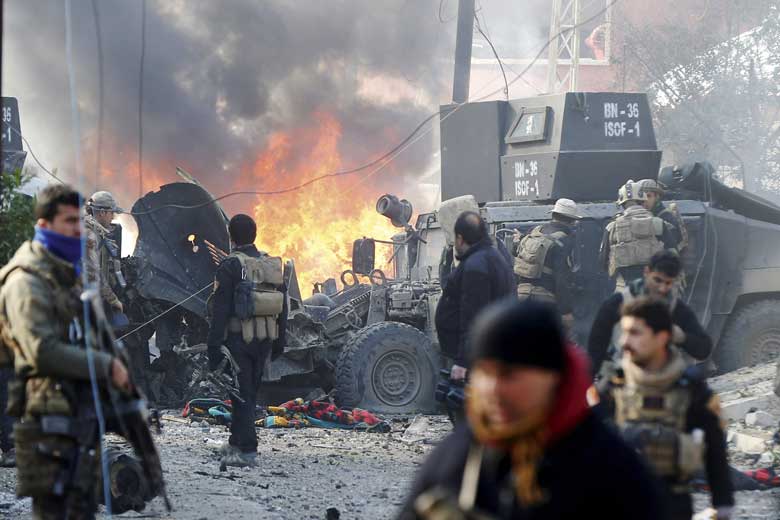

Conflict, low oil prices and political pressures are predicted to weigh on the countrys exports
Since the collapse of global oil prices and the rise of the jihadist group Islamic State in Iraq and Syria (Isis) in 2014, Iraqs oil production has been surprisingly resilient in the face of huge obstacles, recording a significant increase over the past three years.
Despite the ongoing war and low oil prices, Iraq recorded output of 4.56 million barrels a day (b/d) in October 2016, up from 3.16 million b/d in June 2014.
In December 2016, exports from the south hit a record high of 3.51 million b/d.
Constrained growth
However, further significant growth in Iraqi oil production over the next three years is unlikely, despite the countrys impressive track record of boosting output amid challenging conditions.
Future growth is expected to be constrained due to both political and economic factors. At the Opec meeting in November 2016, Baghdad said it would cut production by 210,000 b/d, reluctantly agreeing to its first quota since the 1990s. Whether it will keep to this commitment remains to be seen.
On 10 January, Oil Minister Jabbar al-Luaibi said Iraq had already reduced production by 160,000 b/d, but it is unclear whether cuts are being enforced. Ship-loading data suggests exports are set to increase in February.
Even if Iraq does decide to renege on its promise to Opec (something that would put a severe strain on relations with Saudi Arabia), analysts are doubtful as to whether Baghdad has the capability to significantly boost output.
In June 2015, Iraq cut its 2020 production target from 8.4-9 million b/d to a more modest 5.5-6 million b/d.
Richard Mallinson, an analyst at UK-based Energy Aspects, says it could be difficult for the country to achieve even this smaller increase.
Iraq just hasnt seen enough investment in its energy sector over the past couple of years, he says. The run-up to 2020 could see some incremental gains in oil production, but serious investment is needed to push it over the 5 million-b/d mark and I dont think this is going to happen.

Iraq active energy projects
The lack of investment, driven by the security situation and low oil prices, has devastated Iraqs projects market, derailing dozens of energy schemes.
Between the beginning of April 2014 and the end of September 2016, the value of active oil, gas and chemicals projects in the country declined by 61 per cent, falling from $190bn to less than $74bn, according to regional projects tracker MEED Projects.
Key stalled projects include the $13bn Common Seawater Supply Project (CSSP), which was put on hold in mid-2016. It was hoped the CSSP would transport seawater to oil fields in southern Iraq for injection, easing a water shortage and boosting output. However, progress on the $4bn project at the Majnoon field, operated by UK/Dutch Shell, has been slow. Shell announced it was cutting back on manpower at the site in May 2016, as Iraqs financial problems worsened.
Expansion plans have also been scaled back at the Rumaila oil field. The UKs BP announced it was cutting its budget for the scheme by $1bn in May 2015.
Retaking control
While the coalition fighting Isis has made progress in recent months, military operations have not all gone to plan.
Retaking Mosul is taking longer than the government expected. In 2015, Prime Minister Haider al-Abadi pledged to gain control of the city before the end of 2016. In December, he was forced to ask the country for an extra three months to finish the job.
Only a quarter of the city is under government control, and it has come at a high price. Nearly 2,000 Iraqi troops were killed in November, according to the UN.
Improvements in Iraqs security environment are likely to be slow coming. As Isis has lost ground in the north of the country, Iraq has seen an increase in suicide attacks and bombings in Baghdad. There are also fears that territorial disputes between Baghdad and Erbil could flare up again once Isis has been neutralised.
Even if Al-Abadi succeeds in his efforts to dislodge Isis from Mosul by the end of March, it is likely to be a long time before the governments military gains translate into economic gains and a more attractive business climate for oil companies.

Wil Crisp
Wil Crisp
Wil Crisp is a freelance journalist. He covers the Middle East and Africa with a focus on energy, politics and economics
You might also like...

Iraq signs deal to develop the Akkas gas field
25 April 2024

Emaar appoints beachfront project contractor
25 April 2024

Acwa Power signs $356m Barka extension
25 April 2024

AD Ports secures Angola port concession agreement
25 April 2024
A MEED Subscription...
Subscribe or upgrade your current MEED.com package to support your strategic planning with the MENA region’s best source of business information. Proceed to our online shop below to find out more about the features in each package.








